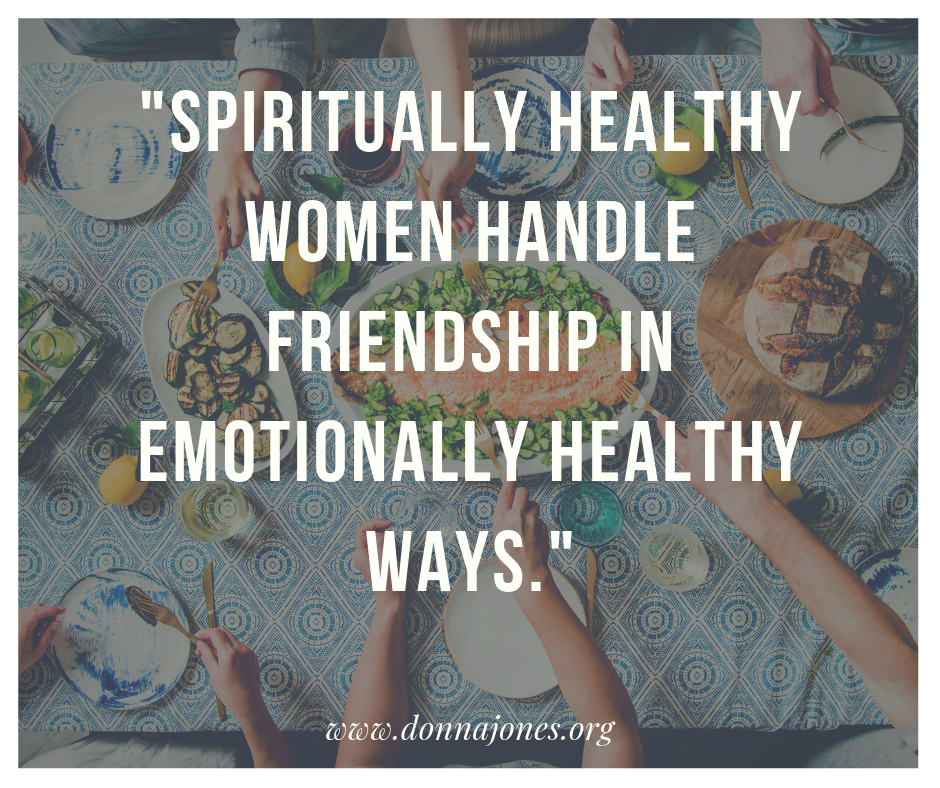“I AM SO MAD AT HER!” The tears in my daughter’s eyes told me she was more than mad. She was hurt.
There’s not a female alive who hasn’t been hurt by a friend at least once. We might be 10, or 20, or 40, or 60, but it happens; a friend’s actions or words pierce our hearts, leaving us wounded and wondering what to do next.
While friendships are one of God’s greatest gifts, friendship can also be a source of great sorrow. It hurts us when friends hurt us.
Because no one wants to be hurt (ever!) our response to hurt can be primal; the “flight or fight” response, which can make us prone to lash out, withdraw, get even, talk trash. But is this the best way to handle hurt in our friendships?
We know it’s not.
Here Are 4 Ways We Can Deal with Friendship Hurts in a Healthy Way:
-
Believe the Best, Until You are Certain of the Worst
I’m convinced if women did just this one thing–believe the best, until we are certain of the worst–the bulk of our friendship drama could be resolved quickly, with a positive outcome.
It’s a sad reality, but too many of us allow our thoughts to go to the dark side. Way. Too. Fast. We attribute hurtful motives to hurtful actions. We make assumptions which may, or may not, be true.
Hurt comes in two forms: 1) intended 2) unintended.
Most friends don’t intend to hurt us. A true friend doesn’t get up in the morning thinking “today I’m going to make _______’s life miserable.” It just…happens. A careless word. A forgotten event. A sensitive subject. A different priority.
Suddenly, someone feels hurt.
It’s easy to assume the sign of a good friend is that she will never, ever hurt us.
So. Not. True.
A good friend may hurt us, but she won’t mean to hurt us, and she’ll be sorry if she did. It’s this kind of heart–one that genuinely doesn’t want to harm another–that marks a good friend.
Why should we believe the best when it’s so much easier to assume the worst?
When we believe the best we give our tender emotions and out-of-control thoughts (Why didn’t she invite me? What did she mean by that comment? I can’t believe she did that!!!) a chance to catch up with reality.
[bctt tweet=”Don’t let your feelings explain the facts; let the facts inform your feelings.” username=””]If a good friend hurts you assume the hurt was unintended until you know otherwise.
-
Develop the Ability to Identify an Unsafe Friend
As we’ve just seen, hurt can be intended or unintended. While it’s rare for friends to admit they intended to hurt us, the fact remains: some friends do intend to hurt us. Even Jesus had his Judas.
How can you spot an unsafe friend?
An unsafe person cares more about herself than the friendship or friend. Her actions will prove it.
Gossip. Manipulation. Betrayal. Rejection. Put-downs. One-upmanship. Lies. Drama. Frequent outbursts of anger. Pressure. These are just some of the qualities you’ll find in an unsafe friend. If you notice a pattern of these behaviors, beware: This person will hurt you.
While it’s crucial to identify unsafe friends, it’s equally important to recognize these behaviors in ourselves.
When we gossip, hold grudges, harbor jealousy, or lie, we are the unsafe friend. If we want to have healthy friendships we can’t rationalize or excuse our hurtful behavior. In God’s eyes, it’s a big deal to hurt others.
So, what do you do with an unsafe friend? Run!
What do you do if you are an unsafe friend? Repent!
-
Talk To the Person, not About the Person
Talking about friends can never heal hurts between friends. It just makes the hurt go deeper. Or lie dormant. Until the next time…
If we don’t talk to our friend to her face, in all likelihood, we will talk about our friend behind her back (Come on. You know this is true). God has some pretty serious stuff to say about gossip, slander, bitterness and unaddressed anger. In short, God says “don’t”. This type of behavior is simply not fitting for a believer.
Instead, God says to handle conflict this way (and He’s not joking): “If your brother or sister offends you, go and point out their fault, just between the two of you. If they listen to you, you have won them over.” Matthew 18:15
“Brothers and sisters, if someone is caught in a sin, you who live by the Spirit should restore that person gently. But watch yourselves, or you also may be tempted.” Galatians 6:1
Truth without love is hurtful. Love without truth isn’t helpful.
But, truth with love is holy. It’s the only equation that can make a relationship whole.
[bctt tweet=”Truth in Friendship + Love in Friendship = Wholeness in Friendship” username=””]-
Handle Hurt in a Healthy Way
I suspect the reason so many believers don’t go directly to the person who wronged them–even when they know they should– is the faulty belief that there is no good way to point out an offense or talk about hurt, and have a positive outcome.
But there is.
Here’s how:
- Start by affirming the relationship (“I value our friendship. I value you.”)
- State the facts (“When you said______________”, When I found out I wasn’t invited”, etc.…)
- Share your feelings or thoughts (I felt ______________; I thought__________).
- If you contributed to the problem or conflict in any way, admit it and apologize.
- Wait for their response. (Their response will indicate what you do next–if anything. In some cases you may need an impartial third party at this point.)
- Forgive and move on–either as closer friends, or with the realization that the friendship is not one that should be close.

God wants us to have good friendships. We want them. We need them. When we follow God’s plan we’ll find the joy in friendship our hearts desire.
You are loved,
Donna
If you’d like more info on how to have healthy friendships, check out Donna’s five-week Bible study, Get Healthy: Friendship.
Did you know you can follow Donna on Instagram? She’d love to connect with you there @donnaajones!



Donna…thank you for sharing your words of wisdom with us. You truly have a God given gift. Four ways to handle friendship hurt in a healthy way was so well written and extremely helpful to me and I know to countless others. You speak the truth in love. You are a fine example of a Christian woman.